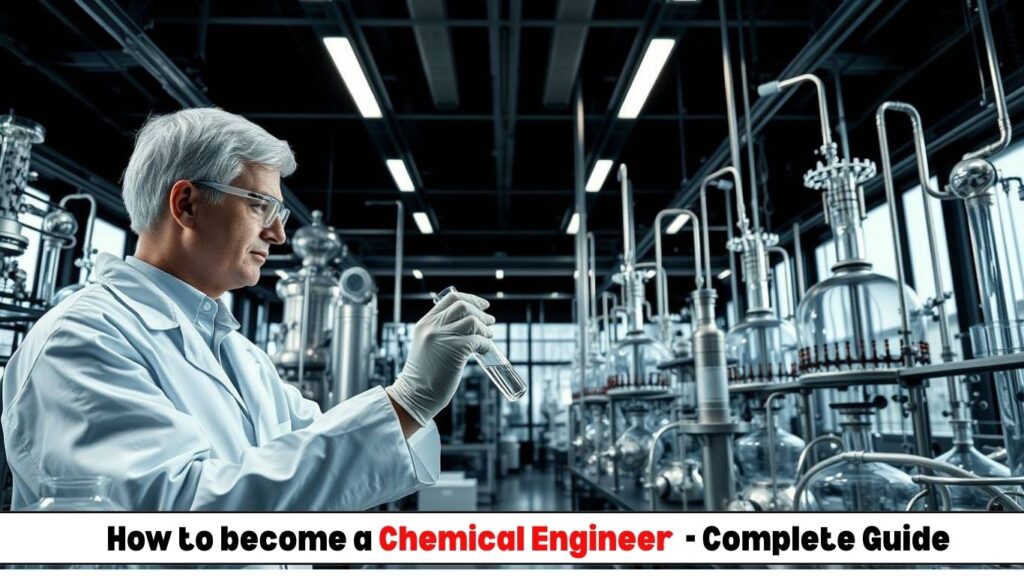
Introduction
Chemical Engineers are the masterminds behind everyday products, transforming raw materials into fuels, medicines, plastics, and food. They bridge chemistry, physics, and engineering to solve global challenges in energy, healthcare, and sustainability.
This comprehensive guide covers:
✅ History of Chemical Engineering
✅ Salary Expectations (Entry-Level to Executive Roles)
✅ Key Roles & Industries
✅ Essential Qualifications & Skills
✅ Step-by-Step Career Path
✅ Future Trends & Job Outlook
Let’s explore this high-impact career in detail!
1. The History of Chemical Engineering
Early Foundations (Pre-1800s)
- Ancient Times: Egyptians used fermentation for bread and beer.
- Middle Ages: Alchemists laid groundwork for modern chemistry.
Industrial Revolution (1800s)
- 1824: Sadi Carnot established thermodynamics principles.
- 1888: George E. Davis coined the term “Chemical Engineering.”
- Early 1900s: Fritz Haber developed ammonia synthesis (fertilizers/explosives).
Modern Era (1950s-Present)
- 1950s: Petroleum refining boomed with catalytic cracking.
- 1980s: Biotechnology revolutionized pharmaceuticals.
- 2000s: Focus shifted to green chemistry and nanotechnology.
Today, Chemical Engineers pioneer carbon capture, lab-grown meat, and mRNA vaccines.
2. Chemical Engineer Salary Expectations
| Experience Level | Average Salary (Annual) |
|---|---|
| Entry-Level (0-2 yrs) | $65,000 – $85,000 |
| Mid-Career (3-7 yrs) | $85,000 – $115,000 |
| Senior-Level (8+ yrs) | $115,000 – $160,000 |
| Executive/Consulting | $150,000 – $250,000+ |
Top-Paying Industries
✔ Petroleum & Energy ($90K-$180K)
✔ Pharmaceuticals ($85K-$150K)
✔ Semiconductors ($100K-$170K)
✔ Biotechnology ($95K-$160K)
Note: Salaries are 20-30% higher in USA, UAE, and Switzerland.
3. Roles & Responsibilities
Core Functions
- Process Design: Develop chemical plant layouts using Aspen HYSYS.
- R&D: Create new materials (biodegradable plastics, battery electrolytes).
- Quality Control: Ensure FDA/ISO compliance in drug/food production.
Industry-Specific Roles
- Oil & Gas: Optimize refinery operations.
- Pharma: Design drug manufacturing processes.
- Food Tech: Develop plant-based meat alternatives.
- Environmental: Engineer carbon capture systems.
4. Qualifications & Skills
Educational Path
- Bachelor’s Degree in Chemical Engineering (ABET-accredited).
- Master’s/Ph.D. for specialized research (e.g., nanotech).
Key Certifications
✔ Professional Engineer (PE) License
✔ Six Sigma Green/Black Belt
✔ FDA Regulatory Affairs Certification
Technical Skills
✔ Process Simulation: Aspen Plus, COMSOL
✔ Lab Techniques: HPLC, PCR, Spectroscopy
✔ Programming: Python, MATLAB
Soft Skills
✔ Problem-Solving (troubleshooting plant issues)
✔ Project Management (Agile, Gantt charts)
✔ Safety Mindset (OSHA standards)
5. How to Get Started
Step 1: Earn Your Degree
- Take electives in biotech, energy, or data science.
- Join AIChE for networking.
Step 2: Gain Experience
- Intern at Dow, Pfizer, or Tesla Battery Labs.
- Assist professors in catalysis/materials research.
Step 3: Build Expertise
- Master process simulation software.
- Publish undergraduate research papers.
Step 4: Land Your First Job
- Entry-Level Roles:
- Process Engineer
- Quality Assurance Specialist
- Research Associate
Step 5: Advance Your Career
- Specialize in AI for chemical processes or CRISPR-based biomanufacturing.
- Pursue an MBA for leadership roles.
6. Future of Chemical Engineering
Emerging Trends
🚀 Green Hydrogen Economy
🚀 mRNA Vaccine Production
🚀 Quantum Chemistry Computing
🚀 Space-Based Manufacturing
Job Outlook
- 8% growth by 2030 (faster than average).
- High demand in renewables, pharma, and nanotech.
Final Thoughts
Chemical Engineering is ideal if you:
✓ Love chemistry but want real-world applications
✓ Want to solve climate change or cure diseases
✓ Seek a versatile, well-paid STEM career
Pro Tip: Learn Python and biostatistics to future-proof your skills.
Ready to Transform Industries?
📌 Comment for free learning resources
📌 Share with future chemists!













Post Comment